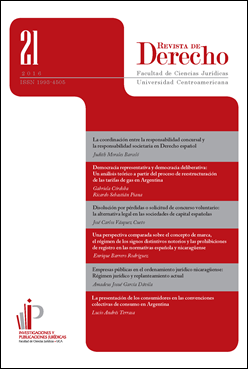Representative democracy and deliberative democracy A theoretical analysis based on the process of restructuring the gas tariffs in Argentina
DOI:
https://doi.org/10.5377/derecho.v0i21.3277Keywords:
Democracy, public hearing, representationAbstract
In this article we expose the first crisis of the recent government of Mauricio Macri due to the judgment of the Supreme Court of Justice of the Nation regarding the policies of adjustment in energy rates. In a context of depreciated rates of the public services, subsidized by the Argentine State, the increase to the the gas rates ordered by the Ministry of Energy and Mining was prosecuted by different user associations for non-compliance, mainly , one of the most valued postulates in current open government policies: citizen participation in public policies.
After a theoretical development that explains the change in recent years concerning the values and presupposition of the representative democracy towards the deliberative democracy, we will analyze the context that led to the increase of the rates, the absence of participative policies and the considerations of the Ruling of the Supreme Court of Justice of the Nation.
We conclude that public hearing, as a mechanism, is not a mere formal requirement, but is substantial to consolidate democratic models in crisis.
Downloads
1813
Downloads
Published
How to Cite
Issue
Section
License
© Copyright Universidad Centroamericana (UCA)
The author undertakes not to submit any article to any other journal or publication simultaneously.The content of the research article is the sole responsibility of the author, as a result, the Law Journal is released from any responsibility derived from the content of the work.
The author assigns the Revista de Derecho, the right to publish the article, distribute it and market it in the way he considers convenient, nationally and internationally, in printed and electronic format;as well as its inclusion in directories, bibliographic bases and international indexes.

This work is licensed under a licencia de Creative Commons Reconocimiento-NoComercial-CompartirIgual 4.0.




